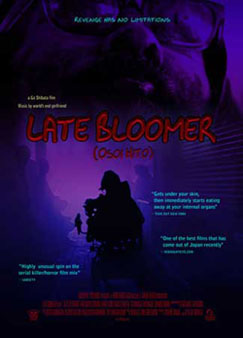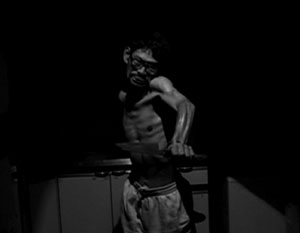Japan has always been the place to go if you wanted to find unique films with original ideas that you won’t find anywhere else (well, that’s until a Hollywood exec sees it and decides there’s some money to be made). Of all of the  fresh ideas I’ve seen utilized in Japanese cinema, Late Bloomer may very well take the cake. A Slasher/Serial Killer film featuring a crippled, wheelchair-bound perpetrator? Yeah, you probably haven’t seen something like it before, and you’re likely not to see anything like it after either.
fresh ideas I’ve seen utilized in Japanese cinema, Late Bloomer may very well take the cake. A Slasher/Serial Killer film featuring a crippled, wheelchair-bound perpetrator? Yeah, you probably haven’t seen something like it before, and you’re likely not to see anything like it after either.
Even though he’s disabled, Mr. Sumida doesn’t let it get in the way when it comes to enjoying every day life. He loves drinking, going to clubs and seeing his friend and caretaker Take’s metal band, watching the occasional porn, and even helping others who are disabled live a better life. Things begin to look even brighter for him when a college co-ed named Nobuko takes over as caregiver for 5 weeks to learn about the disabled for a school project. She and Sumida become friends in a flash, but Sumida-san’s affections quickly develop into something more. One of Sumida’s handicapped friends tells him he’s heading for heartbreak, but Sumida can’t deny his feelings.
Take meets Nobuko when Sumida brings her along to one of his band's shows, and she starts seeing Take when she isn’t with Sumida. A strong jealousy begins to well-up within Sumida, but without being able to convey his emotions properly, it goes unnoticed. He decides if Take isn’t in the picture, Nobuko’s attention will fall back to him, so he drugs Take with sleeping pills, causing him to fall asleep and drown in a bathtub. But with Take out of the way, things don’t change with Nobuko, and Sumida’s rage begins to spiral out of control.
Late Bloomer isn’t just a different film because of its basis. It’s near-peerless in the light that it shines on the handicapped. Most cinematic fare that focuses on someone with a disability deals with feel-good elements, where the person overcomes some impossible feat to make all of us feel better about ourselves. They never really delve into the psyche of the individual, or what torment may be going on in the mind of the person with the disability. Late Bloomer smashes all of that nonsense with a sledgehammer-like blow to the face and takes no prisoners in how it portrays what life is like when you’re living disabled. It certainly helps matters that the star of the film, Masakiyo Sumida, is indeed handicapped in the exact fashion his on-screen character is. It lends a weight to this type of role we rarely ever see, and gives the character serious credibility.

Lest you become offended, Late Bloomer doesn’t really paint the disabled in a bad light either. If anything, the film does a service to the handicapped community in showing that they’re people just like us, with the same feelings, habits, and urges that we all have. Sumida loves partying, getting drunk, rocking out at his buddies metal shows, watching porn, and basically trying to make the most of his everyday life, which when you think about it, is what basically every single human on the planet is attempting to do as well. Unlike the norm however, he ends up becoming a killer, which is another bold statement from director Go Shibata, in which he’s not only attempting to show that the disabled are capable of doing anything, but also stirring up a fear in the average citizen who believes those that are crippled are to be felt sorry for and are “safe”. Regardless of the tone of the film and eventual outcome of events, I think Shibata’s overall message shines through resoundingly.
Another element of the film I found to be quite good is that Sumida, while not being your average serial killer in the obvious respects, is also a very sympathetic character, one who you’ll feel and indentify with more-so than condemn. As a viewer to the proceedings and the physical and mental pain he deals with on a daily basis, you’ll realize that the perpetual smile he has on his face is anything but a sign of happiness. And again, the feelings you’ll develop for him are not because of the situation he’s in; it’s from what he has to deal with every day, like his helpers who seem to treat him like he’s normal and “one of them” but not with much conviction, and the isolation he’s forced to endure on an emotional level. The lives he takes aren’t excusable, and you’ll know what he’s doing is wrong, but at the same time it’s nearly impossible to not understand and identify with the frustration that’s led him to do the things he’s doing.
As good as the film’s ideas and most of its execution is, I found some of the more artistic elements to be a little unnecessary. I understand the need to want to convey Sumida’s mental state in a visual fashion, but Masakiyo Sumida does a fine job of that all on his own, without the need of the more hallucinatory elements. Thankfully, the film is subdued on more occasions than its not, so it doesn't hamper things too much.  The bizarre musical score however is a wonderful fit for the film, with strange sound effects and a vibe all unto its own, helping set the mood and tone of the film admirably. Lastly, I’m not sure I fully understood the final frames of the film. After a portion of the credits roll, a scene plays in full-color, with the camera slowly panning up the street on which Sumida lives, up to his door. The final scene of the film before the start of the credits has that same camera panning backwards from Sumida’s door, and in black and white. The only thing I can figure is that it’s a possible metaphor for director Shibata’s hope that the film will create some forward-thinking in those that had a preconceived notion of the disabled, as during the final black and white scene, the handicapped are moving forward while everyone else is moving backwards. Who knows if I’m right, and it’s definitely something up for debate.
The bizarre musical score however is a wonderful fit for the film, with strange sound effects and a vibe all unto its own, helping set the mood and tone of the film admirably. Lastly, I’m not sure I fully understood the final frames of the film. After a portion of the credits roll, a scene plays in full-color, with the camera slowly panning up the street on which Sumida lives, up to his door. The final scene of the film before the start of the credits has that same camera panning backwards from Sumida’s door, and in black and white. The only thing I can figure is that it’s a possible metaphor for director Shibata’s hope that the film will create some forward-thinking in those that had a preconceived notion of the disabled, as during the final black and white scene, the handicapped are moving forward while everyone else is moving backwards. Who knows if I’m right, and it’s definitely something up for debate.
Late Bloomer won’t be a film for everyone, due to its avant-garde nature and offbeat premise, but the adventurous viewer will no doubt find a lot to appreciate in Go Shibata’s unique vision, and may be taken aback a bit by the classy and sober way it all plays out. Much more of a cerebral experience than an exploitive one, Late Bloomer is a piece of original, uncompromising cinema that deserves your attention.
Late Bloomer sees release courtesy of the good folks at Bone House Asia, and it’s arguably their best release thus far. The film is presented in 1.85:1 anamorphic widescreen and looks great. There’s some schizophrenic cinematography at times throughout the film, and there’s no artifacting that I could see. Photographed in stark black and white, the grain looks excellent and the blacks are heavy and bold, never muddy. The Dolby Digital 2.0 is nice and clear, with some nice bass levels for the unique soundtrack. The removable English subtitles are clear and concise, without any noticeable errors.
The main extras on the disc are interviews involving director Go Shibata and actors Masakiyo Sumida and Naozo Horita (Take). Shibata’s interview runs 33 minutes, and he tells a lot of good stories about the production of the film, such as the film really took shape after working with Sumida for a year in pre-production, caring for Mr. Sumida was just as important as making the film itself, the influence of the Dogme-style of filmmaking on the project due to a restricted budget, and that many of the shots in the film have a documentary feel because that’s just what they were: shooting Sumida to get a feel for him. He also tells a hilarious story about how a studio exec told him he felt the film would have worked better if they had used a name actor acting disabled. It still boggles my mind how some of these studio guys get their jobs…
Sumida’s interview runs 9 minutes, and he tells about his experience making his first film, what it was like filming in his house (which is where much of the film takes place), and that while he could never understand wanting to commit murder, he thinks the film does a fine job portraying how he is in real life, as he loves drinking and women! Horita’s interview clocks in at 17 minutes, and he talks about his band and how Shibata’s love for them is what got him the role, and how he and Mr. Sumida are still friends to this day. Also included is a short director greeting to open up the film, and a trailer gallery for this and other Bone House Asia releases.
Please feel free to discuss "Late Bloomer" here, in our forums!

